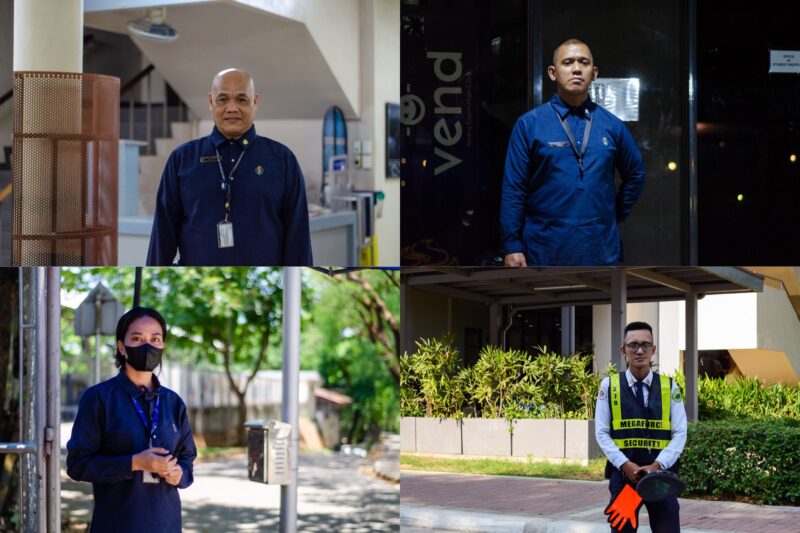Empowering the endeavors of sanitation workers entails supporting them to earn more than simply “enough.”
SANITATION WORKERS strive to keep cities and communities clean. With public welfare on the line, no task is too mundane or meticulous for them.
Toiling day in and out, sanitation workers preserve the pristine conditions of spaces where people can feel comfortable. They go through their work days with pride, whether passersby notice them or not.
However, their own well-being comes secondary, as the absence of safety nets in their workplaces exposes them to constant threats of occupational hazards. The risks they face become more daunting as insufficient salaries leave them struggling to keep their families afloat.
Holding the broom
Working in the University for over 15 years, Kuya Eric currently oversees the Science Education Complex (SEC) A building. Besides mopping floors and changing out trash bags, he also repairs electric power outlets, tends the SEC gardens, and carries equipment during school-sanctioned events.
A short walk away, in the Loyola Heights Barangay Hall, a different sect of sanitation workers dedicate their days to cleanliness. Ate Lot, Kuya John, and Ate Rosemary are part of the Eco-Aides, a team of 11 under the barangay’s Solid Waste Management initiative.
On regular days, they clear garbage from the sidewalks. However, their tasks—like Kuya Eric’s—are not confined to these undertakings. Once a week, they wade through the Katipunan creeks to clear trash from the waters. They also cut off tree branches that might fall on passersby or traveling cars.
After a laborious day, sanitation workers return to their individual families, whose sustenance largely depends on their income. Kuya Eric has two children: one is currently a college student and the other is establishing her career as an accountant. His job helped him pay for his two daughters’ college educations. He casually mentions that he is used to hardship, but he works diligently so his daughters never have to experience it.
Ate Lot and Ate Rosemary, each with their own families, draw the same inspiration from their loved ones to continue in their profession.
While without a household of his own, Kuya John remains resolute in his determination to assist in covering the living expenses of his mother and three siblings who live with him.
For many of them, this position was their sole option to survive as inflation rates soar and employment options dwindle, especially when not all of them have graduated from school. “Ang hirap maghanap ng trabaho sa panahon ngayon kung wala kang pinag-aralan (It’s so difficult to find a job nowadays if you did not receive formal education),” Kuya John says.
Swept under the rug
Facing elusive job opportunities, Kuya Eric and the Eco-Aide workers remain in their current jobs to feed their families. “Natutulungan ko [ang pamilya ko] kasi ito ‘yung pinili kong trabaho (I can help my family because I chose this job),” Ate Lot says.
Despite their gratitude, they also acknowledge the risks their work entails. Ate Rosemary explains that they always have to be careful, especially when dealing with the pavements of Esteban Abada. As they walk along its bustling and uneven sidewalks, they are mindful of their movements and positions, as a single misstep could result in dire consequences they cannot afford to happen.
The creek cleanings they do every Saturday also pose more risks. Ate Jean elaborates that despite wearing boots, rat urine may contaminate the water, increasing their odds of contracting leptospirosis. Ate Lot, Ate Rosemary, and Kuya John all share a mutual dislike towards this particular task.
The Eco-Aides are also first responders during typhoons. “Kung dumating man ‘yung bagyo na may kasamang malakas na ulan at hangin, ‘pag once na may binaha, isa kami sa [mga] maglilikas ng tao (When a powerful typhoon comes that causes a flood, we are some of the volunteers who help those affected),” Ate Jean says.
During these times, they bring evacuees to the barangay hall for shelter, maintain its bathrooms, and distribute food. If a tree falls, they also go out with their chainsaws and bolos to clear whatever it is blocking.
Working with trees, even on regular days, is one of the scarier tasks for Ate Jean, as she had witnessed a colleague get electrocuted after coming in contact with a live wire while trimming tree branches. None of them mention any other instances of someone on their team getting hurt or sick, but this story is a reminder that they will not always be so lucky.
Within the Ateneo, Kuya Eric is also never as far from injury. In rare instances, he and the other maintenance staff help catch and release snakes that wander into the Ateneo buildings. Beyond these occasions, he emphasizes that his predominant concern lies in experiencing bodily discomfort due to the physical demands of handling heavy equipment.
During typhoons, he also goes on-campus for work because he needs to wait for the University to cancel classes. He and his colleagues always notice how slippery the floors get during the rain, so they mop and put up signs to keep the community safe. “Your [the students’] safety is number one,” he remarks in a mix of Filipino and English.
Regardless of weather or location, sanitation workers put their physical safety and health on the line. Knowing this, regulations that ensure they get to go home unscathed must be enforced.
Cleaning from the ground up
All of these workers say that although labor protections exist, they remain invisible and unfelt. Despite putting their welfare at risk, their safety is left to their discretion, rather than overseen by sanctioned procedures. The burden of worrying about their well-being is not on their employers, but on them.
The lack of protective regulations does not just affect these workers, but their families as well. With other people to support, any injury or illness that keeps them from working means less money for everyday needs.
The Eco-Aides consistently highlight that they do not receive adequate financial compensation for their work or the risks it entails. Although they receive hazard pay, such remunerations do not truly alleviate their situation.
“Kulang pa [rin] (It’s still not enough),” Ate Rosemary declares, referring to their Php 9,400 monthly pay. “Pinagkakasya lang namin para lahat meron (We just make it work for the whole household).”
On the other hand, Kuya Eric makes Php 30,000 per month, enough for him and his family to live comfortably. However, the maintenance staff assigned to the Schmitt Hall are the only ones who receive Php 50 per day hazard pay, given that the building houses laboratories with harmful substances.
Ultimately, the Eco-Aides and Kuya Eric do not mind the nature of their duties. “Walang problema po sa trabaho namin kahit mahirap. Kakayanin, kaso kailangan lang po namin ang [mas mataas] na sahod para naman matulungan namin ‘yung pamilya namin (We have no problem with our job even if it is hard. We can endure. We just need better wages so we can help our families),” Ate Lot says, summarizing the sentiments of sanitation workers.
All of them advocate for humane working conditions, but a better life necessitates a living wage that enables them to earn more than simply “enough.” Working towards such a goal clears the dust that clouds the realization of their hopes and dreams. Lobbying for their welfare ensures that their calls to enhance their families’ standard of living will no longer be brushed aside.







